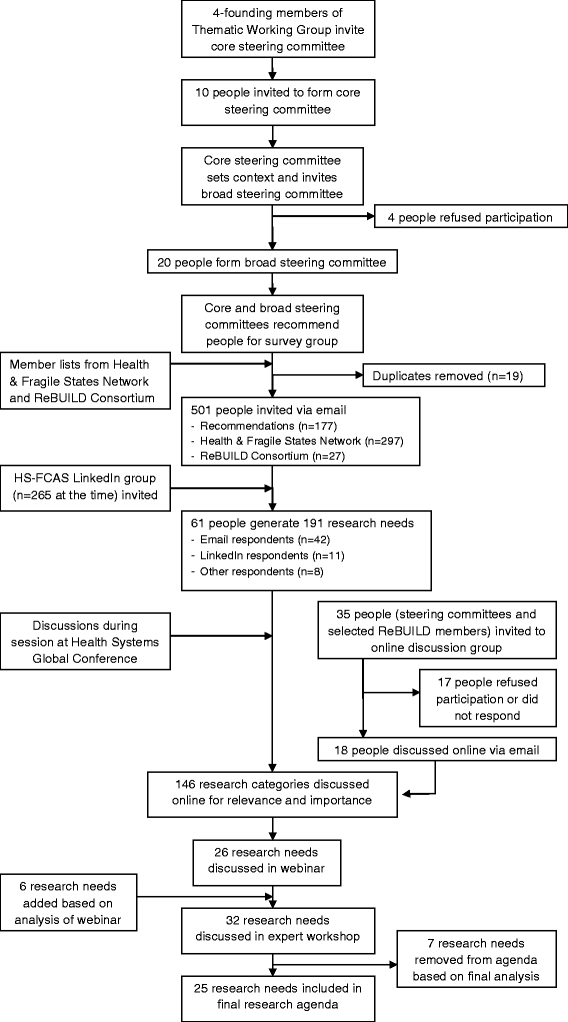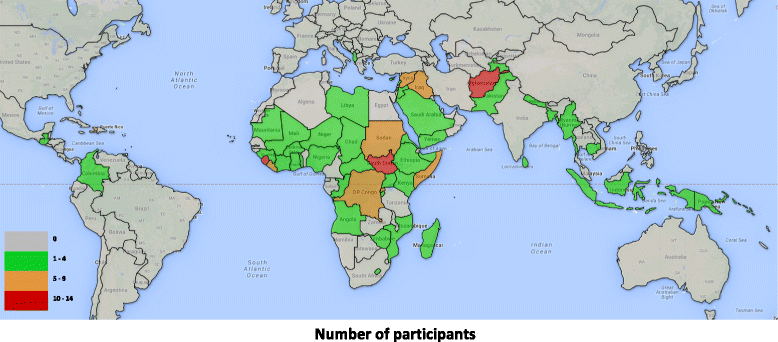Health systems research in fragile and conflict-affected states: a research agenda-setting exercise
- PMID: 27439611
- PMCID: PMC4955129
- DOI: 10.1186/s12961-016-0124-1
Health systems research in fragile and conflict-affected states: a research agenda-setting exercise
Abstract
Background: There is increasing interest amongst donors in investing in the health sectors of fragile and conflict-affected states, although there is limited research evidence and research funding to support this. Agreeing priority areas is therefore critical. This paper describes an 18-month process to develop a consultative research agenda and questions for health systems research, providing reflections on the process as well as its output.
Methods: After a scoping review had been conducted, primary data was collected from August 2014 to September 2015. Data was collected using a mixture of methods, including an online survey (n = 61), two face-to-face group sessions (one with 11 participants; one with 17), email consultation (n = 18), a webinar (n = 65), and feedback via LinkedIn. Two steering committees of purposively selected experts guided the research process - a core steering committee (n = 10) and broad steering committee (n = 20). The process moved from developing broad topics and lists of research needs to grouping and honing them down into a smaller, prioritised agenda, with specific research questions associated to each topic.
Results: An initial list of 146 topics was honed down to 25 research needs through this process, grouped thematically under transition and sustainability, resilience and fragility, gender and equity, accessibility, capacity building, actors and accountability, community, healthcare delivery, health workforce, and health financing. They were not ranked, as all health system areas are interdependent. The research agenda forms a starting point for local contextualisation and is not definitive.
Conclusions: A wide range of stakeholders participated in the different stages of this exercise, which produced a useful starting point for health systems research agenda setting in fragile and conflict-affected states. The process of engagement may have been as valuable for building a community of researchers as the product. It is now important to drive forward the research agenda. Without both a higher profile and deeper focus for this area, there is a real risk that fragile and conflict-affected states will continue to fall behind in global health and development goals.
Keywords: Conflict affected states; Fragile states; Health systems research; Priority setting; Research agenda.
Figures
Similar articles
-
Health systems research in fragile and conflict affected states: a qualitative study of associated challenges.Health Res Policy Syst. 2017 Jun 7;15(1):44. doi: 10.1186/s12961-017-0204-x. Health Res Policy Syst. 2017. PMID: 28592283 Free PMC article.
-
A health equity research agenda for India: results of a consultative exercise.Health Res Policy Syst. 2018 Oct 9;16(Suppl 1):94. doi: 10.1186/s12961-018-0367-0. Health Res Policy Syst. 2018. PMID: 30301455 Free PMC article.
-
Creating a locally driven research agenda for the ethnic minorities of Eastern Myanmar.Health Res Policy Syst. 2019 Jun 26;17(1):64. doi: 10.1186/s12961-019-0465-7. Health Res Policy Syst. 2019. PMID: 31242918 Free PMC article.
-
Prioritizing Possibilities for Child and Family Health: An Agenda to Address Adverse Childhood Experiences and Foster the Social and Emotional Roots of Well-being in Pediatrics.Acad Pediatr. 2017 Sep-Oct;17(7S):S36-S50. doi: 10.1016/j.acap.2017.06.002. Acad Pediatr. 2017. PMID: 28865659 Review.
-
Setting a Nigeria national malaria operational research agenda: the process.BMC Health Serv Res. 2018 Jun 18;18(1):459. doi: 10.1186/s12913-018-3224-5. BMC Health Serv Res. 2018. PMID: 29914453 Free PMC article.
Cited by
-
Factors associated with common mental health problems of humanitarian workers in South Sudan.PLoS One. 2018 Oct 31;13(10):e0205333. doi: 10.1371/journal.pone.0205333. eCollection 2018. PLoS One. 2018. PMID: 30379909 Free PMC article.
-
How can we strengthen partnership and coordination for health system emergency preparedness and response? Findings from a synthesis of experience across countries facing shocks.BMC Health Serv Res. 2022 Nov 29;22(1):1441. doi: 10.1186/s12913-022-08859-6. BMC Health Serv Res. 2022. PMID: 36447261 Free PMC article.
-
Are people most in need utilising health facilities in post-conflict settings? A cross-sectional study from South Kivu, eastern DR Congo.Glob Health Action. 2020 Dec 31;13(1):1740419. doi: 10.1080/16549716.2020.1740419. Glob Health Action. 2020. PMID: 32191159 Free PMC article.
-
A literature review exploring how health systems respond to acute shocks in fragile and conflict-affected countries.Confl Health. 2022 Nov 15;16(1):60. doi: 10.1186/s13031-022-00484-8. Confl Health. 2022. PMID: 36380333 Free PMC article. Review.
-
Capacity for health economics research and practice in Jordan, Lebanon, the occupied Palestinian territories and Turkey: needs assessment and options for development.Health Res Policy Syst. 2020 Sep 3;18(1):99. doi: 10.1186/s12961-020-00586-w. Health Res Policy Syst. 2020. PMID: 32883285 Free PMC article.
References
-
- Burt A, Hughes B, Milante G. Eradicating Poverty in Fragile States: Prospects of Reaching the “High-Hanging” Fruit by 2030. Washington, DC: World Bank; 2014.
-
- OECD . States of Fragility 2015: Meeting Post-2015 Ambitions. Paris: OECD; 2015.
MeSH terms
LinkOut - more resources
Full Text Sources
Other Literature Sources
Medical



